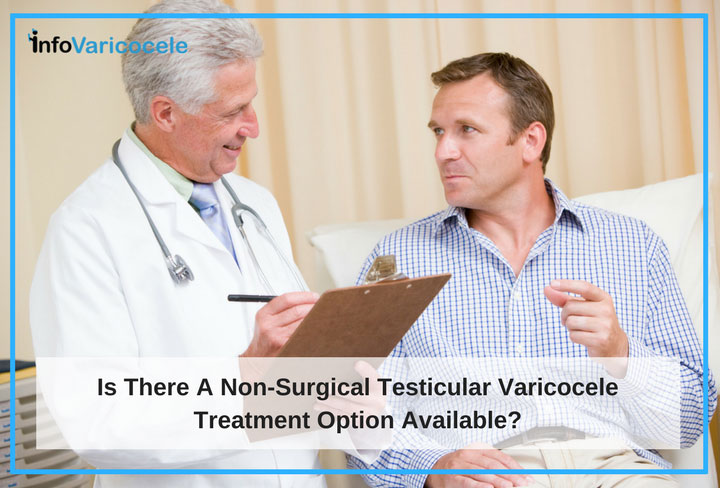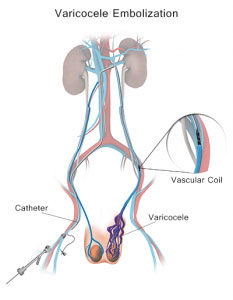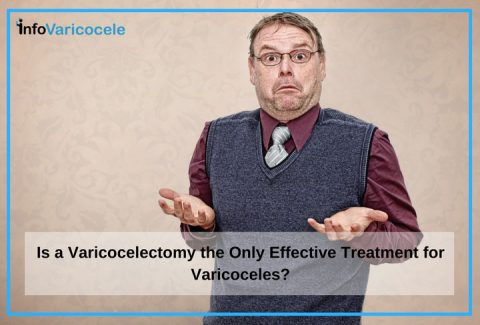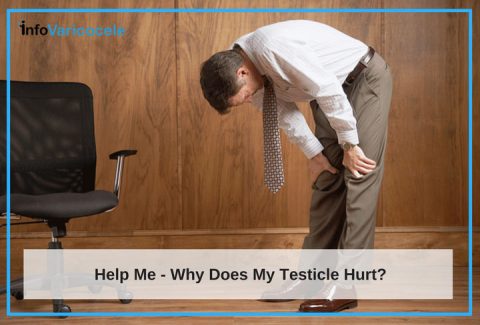
If you are experiencing ongoing or recurring varicocele, you’re probably finding yourself faced with making a decision about what the next step is to treat your condition. It may seem overwhelming to figure out, but with the right information, deciding on the best way to treat your varicocele doesn’t have to be so stressful. Surgery often seems too invasive, and the extended recovery time of up to 2 weeks, with men waiting up to 4 weeks to resume sexual activity, is just not ideal for many men. There is good news, though.
If you’re looking for a varicocele treatment option that avoids surgery, you do have an alternative. Varicocele embolization is a non-surgical, minimally invasive treatment that offers many advantages over surgery.
What is Varicocele Embolization?
Varicocele embolization is essentially closing off dysfunctional veins of the scrotum to allow normal veins to take over blood flow.[i] The procedure has several positive attributes in convenience, including:
- It takes about an hour to complete.
- It is done on an outpatient basis by an interventional radiologist.
- It involves only a small prick, so there is no incision, no scar, and a reduced risk of post-procedure complications.
- The recovery time is typically 2 days, with patients generally able to resume sex in just 1 – 2 weeks.
- Pain from varicocele is often relieved immediately.
How is Varicocele Embolization Performed?
 Varicocele embolization begins when an interventional radiologist nicks the skin and threads a small catheter into the vein. This is usually done either in the groin or neck. Next, metal coils and/or a special solution are introduced through the catheter. The solution decreases dilation of the vein. The metal coils, which are inserted into the affected vein, block blood from flowing through them. Once the malfunctioning vein is shut off from blood flow, healthy veins take over and restore normal blood flow.
Varicocele embolization begins when an interventional radiologist nicks the skin and threads a small catheter into the vein. This is usually done either in the groin or neck. Next, metal coils and/or a special solution are introduced through the catheter. The solution decreases dilation of the vein. The metal coils, which are inserted into the affected vein, block blood from flowing through them. Once the malfunctioning vein is shut off from blood flow, healthy veins take over and restore normal blood flow.
Comparing Embolization with Varicocele Surgery
Many doctors will recommend surgery as a primary option, however newer studies demonstrate that embolization has long-lasting results that make it a viable option.
Here are some statistics:
- One in 10 men who undergo varicocele surgery will have a recurrence.[ii]
- Embolization is frequently successful in cases of men suffering from post-surgical varicocele recurrence.[iii]
- Surgery generally takes about four hours, while an embolization procedure takes about one hour.[iv]
- Surgery requires a local or sometimes a general anesthetic. Embolization requires only a local anesthetic.[i]
RELATED: Varicocele Embolization vs. Varicocele Surgery
Comparing the Risks of Varicocele Embolization and Varicocele Surgery
Surgical risks include:
- Infection at the incision site.
- Artery damage.
- Fluid build-up in testicles.[v]
Complications of embolization may include:
- Temporary pain in the hip.
- Possible allergic reaction to the contrast solution.[vi]
There are two serious complications that can occur as a result of embolization, although statistics from the Society of Interventional Radiologist show they are infrequent. They may include:
- An arterial puncture.
- Migration of embolization materials.[vii]
Varicocele embolization is less invasive, so the risks are naturally reduced in comparison to surgery. An overnight hospital stay is not necessary, and men typically return to work more quickly than after surgery.[i] Varicocele embolization is considered cost effective as compared to surgery. Eligibility of coverage when embolization is used to treat infertility varies so you should always check with your insurance provider.[vii]
Many men are looking at convenience, success rate, and rate of recovery time when researching testicular varicocele treatment options. If you’re hoping to find a varicocele treatment option that is less invasive and has a quicker recovery time than surgery, talk to your doctor about the possibility of varicocele embolization. It may be the course of treatment you’ve been hoping to find.
Sources:
i http://www.sirweb.org/patients/varicoceles/
ii http://www.mayoclinic.org/diseases-conditions/varicocele/basics/treatment/con-20024164
iii http://infertility.about.com/od/causesofinfertility/a/Varicocele-And-Infertility.htm
iv http://www.ncbi.nlm.nih.gov/pubmed/18375298
vi http://www.urologyhealth.org/urologic-conditions/varicoceles/treatment
vi http://my.clevelandclinic.org/health/diseases_conditions/hic-varicocele
vii http://www.ncbi.nlm.nih.gov/pmc/articles/PMC3114590/
viii http://www.sirweb.org/patients/insurance.shtml



